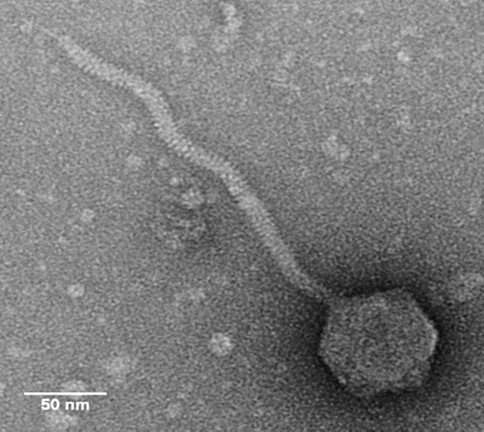#Friendly virus shown to attack Fusobacterium, which causes gum disease and stimulates breast and colon cancer

Table of Contents
“Friendly virus shown to attack Fusobacterium, which causes gum disease and stimulates breast and colon cancer”

In a world first, La Trobe University researchers have discovered a virus that attacks a prominent disease-causing bacterium—a “ringleader” that recruits harmful bacteria to cause periodontitis, and potentially helps cancer grow and spread.
The uniqueness of the virus was recently officially recognized by the International Committee on Taxonomy of Viruses (ICTV), who have named it the Latrobevirus in recognition of its totally new taxonomic genus, or group, following its original discovery in 2019 (published in Scientific Reports).
The friendly virus has been shown to attack Fusobacterium—a bacterium that helps create a biofilm, or cluster of harmful bacteria, that cause serious gum disease, as well as potentially stimulating the growth of certain cancers, including breast and colon cancer.
Lead researcher, Associate Professor Joe Tucci from La Trobe University, said while friendly viruses, or “bacteriophages” (literally “bacteria-eating”) are widespread, no-one had previously discovered one that can destroy this powerful player.
“Fusobacterium is well known for contributing to periodontitis—which can lead to horrible gum disease and jawbone loss—but also can play a role in cancers growing and spreading,” Associate Professor Tucci said.
“If we can harness the potential of this newly discovered virus, it could be a game-changer for treating a whole range of serious diseases.”
Associate Professor Tucci said using bacteriophages instead of antibiotics in treatment for bacterial disease could circumvent a major global health issue.
“We know that bacteria are becoming increasingly resistant to antibiotics, so scientists are looking at other ways to fight the ‘bad’ bacteria that can cause disease in humans. Bacteriophages like this one could be the answer,” Associate Professor Tucci said.
Associate Professor Tucci said highly targeted treatments have other benefits too.
“Prescribing antibiotics to kill an unwanted bacterium is like trying to kill an ant with a shotgun,” Associate Professor Tucci said.
“You damage a lot in the process—whereas if you can introduce a bacteriophage that targets only one particular kind of bacteria, you can kill those bacteria with precision therapy without harming the rest of your microbiome.”
“The bacteriophage has the potential to open up a whole new era of precision medicine, and it’s fantastic that our lab at La Trobe University in Bendigo can be at the forefront of this research,” Associate Professor Tucci said.
How bacteria evade bacteriophages in vivo
Citation:
Friendly virus shown to attack Fusobacterium, which causes gum disease and stimulates breast and colon cancer (2022, October 13)
retrieved 13 October 2022
from https://phys.org/news/2022-10-friendly-virus-shown-fusobacterium-gum.html
This document is subject to copyright. Apart from any fair dealing for the purpose of private study or research, no
part may be reproduced without the written permission. The content is provided for information purposes only.
If you liked the article, do not forget to share it with your friends. Follow us on Google News too, click on the star and choose us from your favorites.
For forums sites go to Forum.BuradaBiliyorum.Com
If you want to read more Like this articles, you can visit our Science category.




